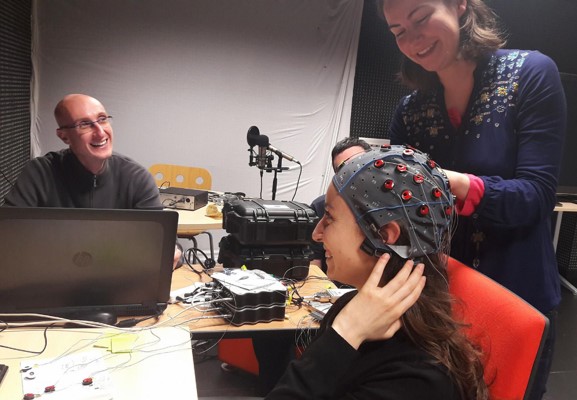Experimenters' influence

General context:
Mental-Imagery based Brain-Computer Interfaces (MI-BCIs), which are neurotechnologies enabling their users to command external digital devices, such as neuroprostheses or videogames, only by performing mental imagery tasks, such as imagining an object rotating in space [Clerc et al., 2016].
While MI-BCI users perform mental-imagery tasks, their brain activity is recorded (often using electroencephalography), processed and translated into commands for the system.
To control MI-BCI, the user first needs to train to produce a reliable brain activity recognizable by the system. During the training, a feedback, which is an information provided to a learner regarding aspects of the performance or understanding of the task/skills to learn, is provided by the MI-BCI system.
The feedback is a fundamental component of the MI-BCI training [Lotte et al., 2013].
However, the literature and experimental results suggest that current MI-BCI training protocols, including the feedback, are inappropriate to acquire MI-BCI related skill [Jeunet et al., 2016].
Some of the users’ traits and states, i.e., respectively their stable and temporary personal characteristics, are correlated with the ability to acquire MI-BCI skills.
Tensed and non-autonomous users, for example, tend to have lower control over MI-BCI than relaxed and autonomous users [Jeunet et al., 2016].
The current lack of reliability of MI-BCI limits the development of the technology outside of research laboratories.
Specific background on experimenters:
Throughout the research and development process of MI-BCI, human supervision (e.g., experimenter or caregiver) plays a central role.
While providing emotional and social feedback, experimenters need to present the technology to users and ensure the smooth progress of the MI-BCI training and use.
Though, their impact on the MI-BCI training outcomes remained unassessed.
Such influence is to be expected as social and emotional feedback were shown to influence MI-BCI performances and user experience and experimenters are the main source of such presence and feedback.
Furthermore, literature from different fields indicate an effect of experimenters, and specifically their gender, on experiment outcome.
Testing the influence of experimenters' gender on MI-BCI user training:
We investigated if an interaction between experimenters' and participants' gender influenced MI-BCI training outcomes, i.e., performances and user-experience.
To do so, we asked 6 experimenters to each train 5 women and 5 men (59 participants in total) over one MI-BCI session.
An interaction between experimenters’ and participants' gender was found on the evolution of a measure of MI-BCI performances.
Another interaction was found between participants’ tension and experimenters’ gender on the average performances.
Therefore, experimenters’ influence on MI-BCI training outcome should be better reported and analyzed in order to further benefit from experimenters’ presence while preventing any bias.
All the details regarding this experiment and its results can be found in the article published in the 8th International BCI Conference in 2019